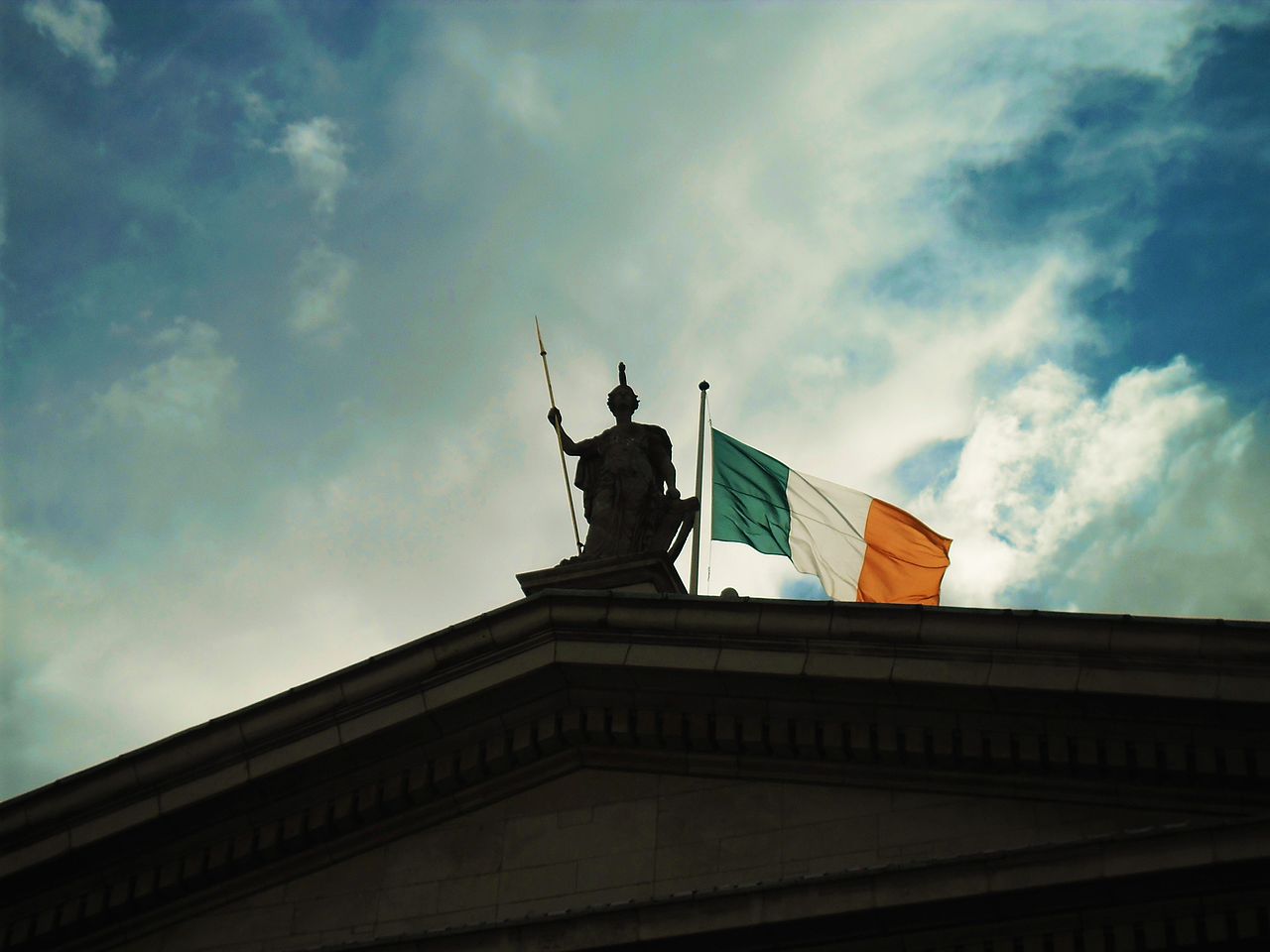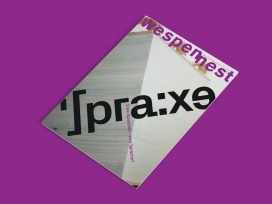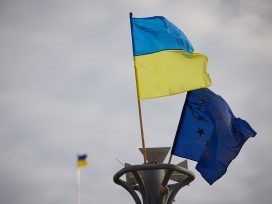In July 2019 the Daily Telegraph newspaper published an opinion article by veteran journalist Bruce Arnold on the continuing conflict between Britain and the EU over the terms of Brexit. As one would expect from this solidly Conservative and Eurosceptic journal, it was perfectly clear in the article who were the good guys and who the bad. The British government, Arnold wrote, was simply trying to implement, as quickly and cleanly as possible, the wishes of its people to proceed to a ‘smooth and prosperous Brexit’. But this reasonable desire was being frustrated by the negotiating tactics of the nation’s various ‘tormentors’ in the European Commission, Council and Parliament.
The particular focus of Arnold’s article, however, was not on these continental rogues but their naive allies closer to home, as the headline indicated: ‘Bought by Brussels, little Ireland’s ridiculous leaders have landed it in a Brexit crisis’.
Arnold, though British by birth and enduring loyalty, pursued his distinguished journalistic career, as critic and political columnist, chiefly in Ireland, where he worked at one time or another for most of the leading newspapers. Perhaps his greatest distinction was to have had his phone illegally tapped by the state in the early 1980s – along with two other journalists – purportedly on the grounds of national security.
Arnold’s high-octane scorn seems to have been sparked by the Irish government’s strategy of unambiguously aligning itself in the Brexit talks with the Commission, and in particular its chief negotiator, Michel Barnier, in the hope that the European side – and all twenty-seven member states – would remain fully united behind Ireland’s central political requirement: that there should be no reintroduction of a physical border on the island after the United Kingdom’s departure from the EU. In spite of Britain’s at times not especially subtle attempts to divide it, this is what Europe did.
Ireland’s position in this political struggle, Arnold argued, would leave it ‘diplomatically estranged from its most important trade and political partner’, while ‘Brussels’, once it had got what it wanted, would lose all interest in the small and insignificant state. Ireland’s taoiseach Leo Varadkar, together with his foreign minister Simon Coveney, were out of their depth and destroying, ‘like wilful children, relations with an ancient and friendly neighbour’.
Had Arnold been writing for an Irish newspaper he would probably have chosen his language more carefully. The colonial mindset that was in evidence in his view of the Irish was one that would have been shared by a good many Telegraph readers: ‘little Ireland’, ‘the ridiculous country in which I live’ – and which he assured us he had loved for sixty years – was led by ‘uncertain fools’, spoilt brats who lacked the intellect to understand big boys’ games. The sentiments would do credit to a 1920s servant of the Raj or a Kenyan tea planter from the ’50s. You know the drill: the country is beautiful and the people charming, but one must remember they are really just children – despite ninety-seven years of Irish independence.

Irish flag flying from the General Post Office in Dublin. Photo by Mitt from Wikimedia Commons
First, some history
If Irish people were asked how they would describe their country’s historical relationship with Britain (or England), a number of quite different answers might emerge. It is unlikely, however, that many would see that relationship as being one with ‘an ancient and friendly neighbour’.
The English, or more precisely the Anglo-Normans, arrived in Ireland in the late twelfth century. What they were after was fertile land, which they quickly took possession of by dint of superior military technology and organisation. British conquest of the island of Ireland, however, remained incomplete until two major armed conflicts, at the turn of the sixteenth and seventeenth century, and towards the end of the seventeenth. These brought about the final defeat and exile to the continent of Ireland’s native aristocracy, which had led the military resistance to the occupiers. Ireland became a nation of peasants – often landless peasants – while many members of its traditional ruling class found positions in the armies and navies of the major European powers – notably Spain, France and Austria-Hungary, and even in South America.
The O’Donnell family, whose chieftains had sailed away from Donegal in 1607, supplied Spain with many generals and admirals and, in the nineteenth century, even a prime minister, General Leopoldo O’Donnell. Another descendant of émigrés, Patrice de Macmahon, was president of France in the 1870s. In roughly the same period, Count Eduard Taaffe became prime minister of the Austrian lands, while another O’Donnell, Count Maximilian, helped foil an assassination attempt on the Austrian emperor Franz Josef in 1853. Bernardo O’Higgins led the successful Chilean struggle for independence from Spain; and Admiral William Brown founded the Argentine navy.
If many members of the native Irish upper classes found an outlet for their talents in foreign military service, the population left at home for the most part faced nothing but poverty, disenfranchisement (as Catholics) and, in the nineteenth century in particular, starvation. About one million people died as a result of the Great Famine of the 1840s and perhaps a further two million left the country, an exodus which did not stop in subsequent decades. In 1841 the Irish population was more than eight million. By 1881 it had fallen to just over five million and by 1901 dropped again to under 4.5 million. In 1961 it was 2.8 million (although figures from 1926 onwards exclude Northern Ireland). The census of 1971 was the first to show a rise in population since before the Great Famine, with a figure of just under three million. The intervening decades – which are also the period of Ireland’s membership of the EU – have by contrast seen very strong population growth, to a current estimated figure of just under five million.
But Ireland’s nineteenth century was also when the seeds of future independence were being sown through the development of a well-organised mass democratic movement under the leadership of first Daniel O’Connell (1775–1847) and later Charles Stewart Parnell (1846–1891), both of whom sat as MPs in the British parliament at Westminster. Successive elections from the 1880s onward saw those who backed ‘home rule’ winning an overwhelming majority of the Irish seats, but London consistently refused to grant Ireland legislative independence until after the War of Independence between 1919 to 1921. The treaty settlement afforded something close to full independence (a ‘free state’ with a persisting symbolic link to the British monarchy) to twenty-six of Ireland’s thirty-two counties. The six northeastern ones (Northern Ireland), where the majority population descended from Protestant Scottish and English ‘planters’ settled in the seventeenth century, and whose allegiance remained staunchly British, stayed as part of the United Kingdom.
Independent and European
It is certainly helpful, and perhaps even necessary, to have some at least rudimentary idea of Ireland’s history to understand where the country is today, how it feels about Europe and Britain and how it will react to the latter’s severance of its links with the EU. It is not the case that most Irish people dwell obsessively on their history or are consumed by bitterness about the injustices of the past. Nor is the country unique in having a troubled history. But attitudes to history and divisions over the meaning, or even importance, of that history have played a significant role in Irish intellectual life and continue to do so, particularly during the current ‘decade of commemoration’. A hundred years later, there has been fresh examination of the period beginning with the labour unrest of the 1913 lockout in Dublin and ending with the conclusion of the post-independence civil war in 1923. This has produced not just a great deal of public discussion, but also an impressive addition to the historical literature, the readership for which extends far beyond the academic sphere.
If support for Irish independence in the early twentieth century was enthusiastic and overwhelming, national self-confidence can be seen to have abated somewhat in the decades that followed. Emigration continued, rural and urban poverty persisted, and the pre-independence view that we simply had to take control of our own destiny to solve the problem of underdevelopment began to look simplistic. Emigration also certainly functioned as a safety valve, removing many of the most dissatisfied from the national body politic. The political left notably failed to develop in the new state, with many of those who might have provided its social and intellectual basis making new lives for themselves and their families in Boston, Glasgow or the English Midlands.
The official ideology of the state, particularly during periods when the dominant political party, Fianna Fáil, was in power, remained ‘Irish Ireland’, an aspiration towards a distinct and separate cultural identity opposed to ‘materialist values’ – associated with England – and based on the Irish language, Irish traditional music and sports. For many, it also entailed the ‘special position’ of the Catholic church, which was enshrined in the new constitution of 1937.
But co-existing as a minority substratum was a group with a more sceptical view of the new nation, whose members doubted if the dying Irish language would ever be revived, perhaps preferred soccer or rugby to Gaelic games, often took a cynical view of the capacities of the state and, in some cases, seemed even to doubt if Ireland had the resources within it to build a viable and prosperous state independent of Britain.
Such people tended to be christened by their more nationalist opponents ‘West Britons’ or ‘West Brits’. From the 1970s onwards, with an increasing number of deaths resulting from violence in Northern Ireland, many people in the South also began to ask if it was wise to unquestioningly celebrate the insurrectionary movements which had brought us our independence. If we made heroes of the leaders of the 1916 Rising, executed by the British, would that not encourage the young of the present generation to think that dying (and killing) ‘for Ireland’ was still a noble thing? And was our history really the simple tale of oppression on one side and doomed heroism on the other that our schoolbooks seemed to suggest? Some historians – soon dubbed revisionists – suggested that the story was a little more complex, particularly in relation to Northern Ireland. Fifty years on, the divisions between revisionists and anti-revisionists have not died down and still provoke lively interest.
If the traditional historiography favoured in our schools often told a simple story – one widely caricatured as ‘800 years of oppression’ – some of the generation who were coming to adulthood as Ireland joined the EEC offered a radically different view: that the political inheritors of the national revolution (and in particular Fianna Fáil) had failed to deliver the goods: having abandoned the idealism of the founding generation and embraced petty corruption, they now had nothing left to offer.
For these educated baby boomers, many of whom were to become leaders of opinion in journalism over the next thirty years, it was not the English who were the great oppressors but our own nationalist patriarchs and their clerical allies. It was they who had imposed on us a regime of narrow cultural nationalism, obscurantist Catholicism, sexual repression and obsession with a Gaelic past that was irretrievably gone. This was exemplified – in what seemed to be a widely shared resentment – in memories of tedious school hours spent learning by rote the moods and tenses of the irregular verbs of a language no one any longer spoke.
For those – probably the majority – who still identified positively with the independent state for all its imperfections, there were also anxieties. The nation seemed to be short of success stories, or at least unsure if being ‘famous in Ireland’ was quite enough. A frequent headline in newspapers at least until the 1980s was of the ‘Irishman’s success abroad’ variety (‘Corkman is Philadelphia police chief’, ‘Leitrim priest honoured in Melbourne’). Such instances may not have been as regular as my memory suggests, but certainly it was a trope of the times and it is not difficult to unpick its meaning. Emigration had forced many of our people out of the country: we were still interested in how they were doing half a world away and pleased if they were doing well.
For surely this said something also about those who remained: namely, that we were not as irredeemably feckless as the caste which had long run things in our country suggested, and that given more favourable circumstances than those of 1880s Donegal or 1920s Longford, Irish people might do as well as anyone. This anxiety for validation may also help explain how well-informed we were about the European careers of our exiled aristocracy (romanticised as ‘the Wild Geese’).
It is probably the case that neither those who anxiously wished the state well nor those who thought it unlikely to ever amount to much noticed the degree to which things were beginning to change, with economic effects that were felt particularly from the 1990s onward (‘the Celtic Tiger’), but which were the result of earlier positive economic adjustments. However, it was also the case that the latter group had a tendency to exaggerate Ireland’s (negative) singularity – ‘Only in Ireland!’ was, and remains, a familiar expression of exasperation. As the economic historian Kevin Hjortshøj O’Rourke put it in an essay published in the Dublin Review of Books in 2017:
There can at times be an attention-seeking particularism about Irish writing – look at us, we like to say, mostly to ourselves, but if possible to any foreigners who might be listening as well – look at us, and at how unique, and at how very interesting we are. When I was a young boy in primary school, we were taught that post-independence Ireland was poor but uniquely virtuous. Today, we are taught that it was poor and uniquely wicked [a reference to revelations about society’s treatment of women who became pregnant outside marriage]. Both positions are misguided: we were never as different as people have made out.
O’Rourke made three points. First, that Ireland’s post-independence economic record was not as unusual in a European context as people imagined; things which had happened in Ireland (including indeed patriarchal oppression) had also happened elsewhere. Second, the country was long hampered by excessive dependence on a UK economy which was itself performing poorly. Third, EEC membership, and later the single market, were crucial for Ireland. Independence and membership complemented each other. Independence would not have worked as well without the EU, and the EU would not have worked as well without political independence.
Opposition to Ireland’s joining the EEC in 1973 – at the same time as Britain (and Denmark) – was voiced chiefly by a sovereigntist current, mostly on the left of the political spectrum: there was much talk of the Community being ‘a rich men’s club’. Éamon de Valera, the founder of Fianna Fáil and ‘father of the nation’, then president, voted against, no doubt preferring a future in which Ireland would be more economically and culturally self-sufficient, if poorer. In this aspiration he lacked the support both of the party he had founded and of the Irish people, 83 per cent of whom, in a high poll, voted for entry.
Anti-Brexit, not anti-British
In 2016 Ireland celebrated the centenary of the Easter Rising, an historical event heavy in symbolism which is seen to have sparked the successful independence movement. The enthusiastic yet calm atmosphere in which the many commemorative events took place across the country suggested that those who saw the celebrations as at best an absurdity and at worst an encouragement to those who might wish to pursue ‘unfinished business’ in Northern Ireland were out of touch with majority opinion. It was also significant that the feature of the ceremonies which seemed to elicit the most enthusiasm was the presence not of any political dignitary (with the possible exception of Michael D., as the much-loved president is popularly referred to), but of detachments of the Irish Army. As a symbol of statehood, the Army seems to command the loyalty and affection of the people in a way that the other insistent claimant to historical legitimacy, the Irish Republican Army (IRA), does not.
In the same year, on 23 June, Britain voted to leave the European Union. An opinion poll carried out a week later found that if a similar question had been posed in Ireland, 80 per cent would have voted to remain and 13 per cent to leave, with 7 per cent undecided. Further polls confirmed this general picture of Irish opinion. A few small political movements emerged on the far right to campaign on a national sovereignty platform, as well as on hostility to immigration and support for ‘traditional values’, but dismally failed to make any impact electorally. Somewhat more seriously, one newspaper, the Sunday Business Post, hosted a series of opinion pieces arguing that Ireland’s economy and trade was inextricably tied to Britain’s and that, if it wished to prevent collapse, it should now follow the UK out of the Union. But these urgings also failed to elicit any positive response. It could not have been clearer that ‘Irexit’ was a non-starter.
Now that a no-deal Brexit has been averted, and with it the disaster of a hard Irish border, attention has begun to turn to the possible effects that the saga may have had on national attitudes. Some liberal commentators lament a perceived increase in anti-British feeling in the country. Indeed, many Irish people will have noticed something very like antipathy to certain loudly expressed British notions, both in others and themselves. In an opinion poll carried out almost two years ago, 66 per cent of respondents said they had a less favourable view of the UK as a result of the Brexit process. In answer to another question, eight out of ten said they would prefer to cut economic ties with the UK rather than with the EU.
Last November the Irish Times columnist Finn McRedmond wrote of what she saw as ‘an increasing comfort with anti-Englishness’, not created by but emboldened by Brexit, the outrageousness of some of whose cheerleaders had encouraged our own ‘base tendencies for bigotry’. In the following month another columnist from the same newspaper, the very level-headed Kathy Sheridan, wondered if we were not ‘enjoying the Brit-bashing just a tad too much’.
Some of this worry no doubt derives from a fear that the main political benefactors of any growth of anti-English feeling in Irish society will be Sinn Féin. However, Irish people’s feelings about English people are in general calm, mild and, above all, normal. Many of us have experienced periods of temporary immigration in England; others have close family and relations permanently settled there; we enjoy their football and watch their detective mysteries and quiz shows on television. In very many respects they are not ‘foreign’ to us at all. Our trading links are long-established and will continue to be important even after Brexit. We share responsibility for the peaceful management of the post-conflict situation in Northern Ireland. In the future we will have to get along together, and we will.
The undoubted strain which has entered relations between the Irish and British over the last decade is due almost entirely to the ascendancy of that political cabal which has successfully pushed the Brexit agenda. Irish people of course could not stand Thatcher, but did not have any problem with Neil Kinnock, John Major or Tony Blair. It may be the case that they have never particularly warmed to the upper class elites who traditionally run the Conservative Party, but they tend to have a quite active dislike of figures like Nigel Farage, Jacob Rees-Mogg, Michael Gove and Boris Johnson.
Moreover, they regard the organs of propaganda which have helped deliver Brexit – The Daily Telegraph, the Daily Mail, the Daily Express, The Sun – with a mixture of contempt and loathing. If they feel that a substantial number of British voters have been deceived by the politicians who have coasted to power on the back of Brexit, and by cynical backroom political operators like Dominic Cummings, and that the ordinary Briton will not reap the benefits he or she is expecting – well that is a view they share with a very substantial minority of British people. The negative feelings about our neighbours which seem to worry the Irish Times liberals are not essentially anti-British at all, and they will pass, just as – or so one hopes – Boris Johnson and his government will pass.
The view, meanwhile, that Brexit must necessarily force to the fore the question of united Ireland is largely fantasy. Recall that the Dublin government is absolutely opposed to a poll being held on the issue in Northern Ireland in the near future, as Sinn Féin demands. Such an event, and the campaigning which would go with it, is seen as being highly likely to inflame the situation, possibly bringing a return of violence. This is not to say, however, that there is no interest in the South about what would be involved in such a momentous change.
European prospects
Opinion surveys over several decades have shown Ireland to be among the most clearly ‘pro-European’ of member states. And yet there has also always been a sceptical minority, on the EU as on most other issues. One long-serving Irish politician once remarked that if there was to be a referendum campaign based on the question ‘Do we all want to go to heaven?’ the No side would start out with at least 20 per cent support. An opinion poll commissioned by the European Movement in January 2013, when Brexit still seemed a remote and unlikely event, found that 29 per cent of Irish people felt that if Britain left the European Union Ireland should follow. By the time of the actual vote more than three years later that figure had dwindled to 13 per cent. What had happened in the interim, I would suggest, was that Irish people had had ample opportunity to see the campaigning face of Brexit. They did not like what they saw.
More than twenty years ago, Ireland’s then deputy prime minister, Mary Harney, made a speech in the United States which was to provide a long-remembered soundbite. ‘Geographically,’ she said, ‘we are closer to Berlin than Boston. Spiritually, we are probably a lot closer to Boston than Berlin.’ Not everyone agreed at the time with the implications of this economic-cum-spiritual orientation and the ‘Boston or Berlin?’ question remained live in Irish politics for quite some time.
Political scientist Brigid Laffan suggested, in a book published in 2019, that Ireland had anchored itself in three spheres – the UK, the US and continental Europe – and had not so far been forced to choose between them. Certainly relations with the US have always been important to Ireland, and are only likely to become warmer with the new occupant of the White House, a man who makes no secret of his pride in his Irish heritage. As regards the UK and Europe, Ireland has finally been forced to choose, and has chosen very decisively Europe.
The two strong political rivals who each led governments in the early days of Ireland’s European involvement, Charles Haughey (1979–81, 1982, 1987–92) and Garret FitzGerald (1981–82, 1982–87) were both working from a philosophy which had an overarching understanding of Irish history. They hoped to see the country assert itself internationally by developing multiple relationships, instead of the suffocating single one that had long characterised our economy and our mindsets. In practice, this often meant a closer alignment with French positions than with British ones, an orientation which was to change as Irish politics began to evolve in a more neoliberal direction under the influence of Harney and her small Progressive Democrats party, when it found itself backing much of the low-tax, low-regulation, anti-political-union philosophy of the British.
With London now removed from the equation, there will very probably be a modest reset of Irish perspectives and alliances. As one now retired senior civil servant put it in 2019: ‘It was a piece of reality that in many cases we agreed with Britain in terms of issues like taxation or whatever. Whereas now we’re in a new regime and therefore in our relations with the EU we will have to rethink a bit.’
The long-term strategic view that underpins Ireland’s political orientation into the future is based on a positive and optimistic view that the country can play a valuable part, with its allies, in meeting the many serious challenges that Europe faces. Ireland has been well-served by its ‘permanent government’ – the senior civil servants and diplomats who have provided continuity and helped deepen our European relationships over several decades.
Over the last decade, Ireland has been confronted with an existential choice about how it sees itself and its role internationally. It has come down very decisively on one side. It would be too much to say that this has made us unambiguously enthusiastic Europeans, if by that is meant a people whose hearts beat wildly to the sounds of Beethoven’s ‘Ode to Joy’. Ireland remains a largely monolingual culture where there seems to be a marked reluctance to learn European languages while culturally it is, in Laffan’s words, comfortable with ‘multiple cross-cutting fuzzy identities’. But perhaps in this respect too – in the considerable gap in world view that exists between the bulk of the population and the political and administrative elites which conduct the nation’s foreign policy – Ireland is again not so very different from other European states.







